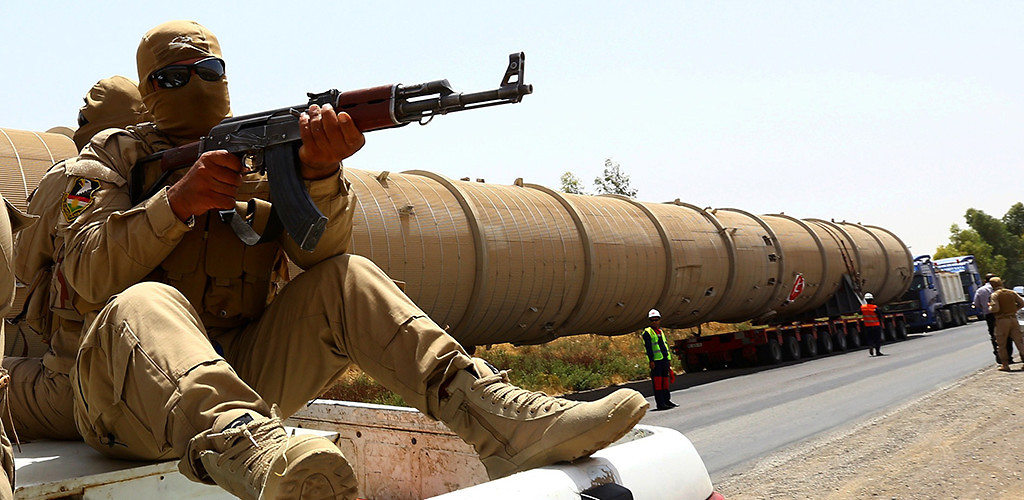A section of an oil refinery is guarded as it is brought on a truck to the Kawergosk Refinery, some 20 km east of Erbil, the capital of the autonomous Kurdish region of northern Iraq, July 14, 2014. (Safin Hamed/AFP/Getty Images)
When countries become involved in remote conflicts there is often a significant divide between the justification offered by their governments and what the public perceives to be the motivation for taking action. In the 344 armed interventions in civil wars that took place from 1945 to 1999, and many more since, the official rhetoric has typically revolved around ethically grounded issues such as the “war on terror,” the promotion of democracy, the combating of ideologies such as communism, or the support of oppressed populations. This comes as a stark contrast to the perception of the population at large, which often associates military action with achieving geopolitical or economic aims. Perhaps the most widespread—and controversial—of these suspected goals is the pursuit of oil.
In our recently published study “Oil Above Water: Economic Interdependence and Third-Party Intervention,” co-authored with Kristian S. Gleditsch, we applied statistical evidence and rigorous analysis to investigate the truth of this particular claim. We built on recent studies that demonstrated what was until recently seen as a conspiracy theory: the close interlinkages between military interventions and trade. One of these studies provided statistical evidence that Central Intelligence Agency covert operations during the Cold War resulted in increased imports of United States goods from target countries, without the same holding true for exports. Another, prepared by us and co-author Leandro Elia, demonstrated that US military assistance increased non-military bilateral trade flows with the recipient country.
“Oil Above Water” is the first statistical analysis to explore whether oil is a motivating factor for military interventions in ongoing civil wars, and confirms the suspicions of the public in this area. We found that oil production and known oil reserves are central factors motivating third-party military interventions. More specifically, we demonstrated that the higher the quantities of oil produced and/or owned by a country at civil war, the higher the likelihood of third-party intervention. Moreover, and in accordance with our predictions, we found that the tighter the oil market is, the higher the likelihood of third-party intervention. In other words, in periods where world oil production is concentrated in the hands of fewer countries, civil wars in oil-producing countries are more likely to attract foreign military involvement. Lastly, and perhaps most importantly, we have provided statistical evidence that the likelihood of a nation intervening militarily is positively tied to the quantities of oil imported by that specific country. While other factors also play a role, intervention is approximately 100 times more likely when the country at war has a high value of reserves and the intervening country has high oil imports than when the country at war has no oil reserves and the potential intervener has high oil exports.
The study aimed to go beyond purely conspiratorial discourses and actually demonstrate whether or not there was truth to what many people had taken for granted. Our focus on civil wars was motivated by the fact they made up more than 90 percent of all armed conflicts since World War II. Our research relied on a sample of 69 countries that had a civil war between 1945 and 1999, about two-thirds of which saw third-party intervention. The theory we developed builds on the understanding of the monopolistic nature of the oil market. Because there is only a small number of oil suppliers, world prices are sensitive to the production of each of these countries. Aware that disruptions in the oil markets would translate to increases in the price of energy, governments of oil-importing countries are therefore concerned with the stability of production among exporters.
The question now is: Can we use our results to predict future military interventions? We can certainly extrapolate that with the US massively developing its domestic fracking industry, and therefore becoming decreasingly dependent on oil imports, American troops will likely become less involved in civil wars that disrupt the oil market. We can also look to the high-profile case of the Islamic State (ISIS) and the international response it has attracted. At the time of writing, ISIS was approaching and trying to control oil fields in Libya, leading to support for NATO intervention by Italy and France, the leading single recipients of Libyan oil. Our research also tells us we should expect rapidly developing countries with growing energy needs to become increasingly concerned with the stability of the oil market. The picture could, however, dramatically change if the price of oil collapses in the future.
Taking a historical viewpoint, oil seems to be taking the position of grain, over which the Romans fought wars, or perhaps that of the spices that justified the cost of the Age of Discovery of the 15th century. We have shown that oil does motivate military interventions, and military assistance and interventions promote the commercial interests of the intervening country. This adds another dark dimension to the implications of modern societies’ dependency on oil, while also raising questions about the ethical grounds of such military interventions. These questions could consider the fact that military action might improve the wellbeing of the average citizen in the intervening country by shortening the duration of civil wars and thereby avoiding spikes in the price of oil, or the way that fighting terrorism abroad or waging proxy-wars such as those of the Cold War may benefit citizens at home. At the end of the day, the national interest prevails in governments’ decisions to wage costly operations abroad. We will leave it up to others to decide whether or not this reasoning is ethical.
Vincenzo Bove is an Assistant Professor in Politics at the University of Warwick. Petros G. Sekeris is a Principal Lecturer in Economics at the University of Portsmouth.





